-
A BALANCE 由宇子の天秤 (Yujiro Harumoto 2020)
YUJIRO HARUMOTO: A BALANCE 由宇子の天秤 (2020)
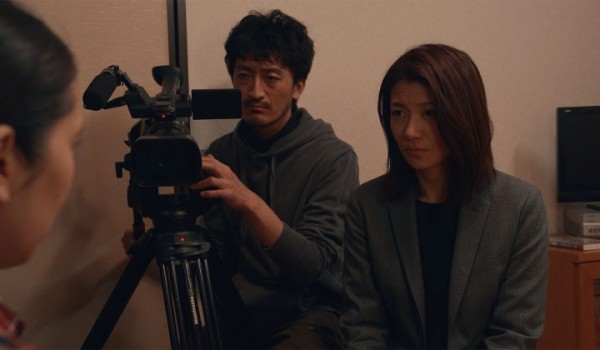
KUMI TAKEUCHI (RIGHT) IN A BALANCE
TRAILER
Suppose what you're making a documentary about happens to you
Asghar Farhadi has been mentioned and the ending struck me as having the stunning unresolved finality of Michael Haneke. This is to say Yujiro Harumoto's sophomore feature marks him as a significant talent, the kind who takes on big issues in complex ways. The linear narrative, weaving through several threads, starts with protagonist Yuko (Kumi Takiuchi), a very serious, quietly determined, and rather beautiful documentary filmmaker interviewing a man after he plays a flute by an urban-side river (the opening music is diegetic, and the rest is so austere there is no score). The parallelism that develops as the story line proceeds is a little gratuitous, and the whole film, which could have worked well as a miniseries, is pretty long. But A Balance has the excitement and the fascination of an investigative thriller with profound moral and social overtones. It moves at a measured pace but it's compulsive and propulsive.
Yuko is the final stages of shooting her documentary about a school scandal that led to two suicides - first of a schoolgirl, HIromi, accused of having sex with her teacher, which he denied, then of Mr. Yano, the teacher, who left a note saying his death is his protest against the injustice of the accusation against him. The flautist, Mr. Hasebe (Yuya Matsuura), was the girl's aggrieved father. Yuko seeks to tell the whole story, without taking sides, and also chronicle the repercussions from sensationalist media coverage that has left waves of ruined lives all around this scandal. The result is to be broadcast on television. Her stern encounters with her photographer and her producer (Yota Kawase) by the riverside in that first sequence show how principled and intense she is. But this is Japan and voices are never raised. There will be many telling little debates between Yuko and her producer, the latter a kind of middle man between idealistic filmmaker and business-savvy television executives.
Bureaucratic controls are strong, though, and we immediately see Yuko's desire to tell a complex story thwarted when in a meeting the suits of the TV station excise and rearrange lines of a the filmed interview to simplify scenes and make this simply a story about bullying: Mr. Hasebe's criticisms of mass media won't do.
Yuko seems wedded to her work, but her subtly hennaed hair has an elegant sweep and her no-nonsense clothes, if they're a hair shirt, look very good on her. But she's no movie-glamorous crusading journalist whose project is window dressing: the whole focus is on the unfolding information. on doing the work.
Yuko has other work as well, however, because she helps out as a tutor at the cram school of her father. Mr. Kinoshita (the meek-looking Ken Mitsuishi). One day she helps a girl student, Mei (Yumi Kawai), who's having a "heavy period." (Yumi Kawai, as Mei, is a quiet and subdued bombshell with dreamy eyes and bee-sting lips, a diminutive Asian Léa Seydoux.) It turns out Mei is pregnant, and she tells Yuko it's Mr. Kinoshita, her father, who is responsible. This could be the end of everything, the school, her father's livelihood, her career.
Yuko is still deep in her documentary. We've seen her do several very tricky and dramatic interviews with Mr. Yano's mother, Toshiko (Mitsuko Oka), who is now on the run, forced to move from one clandestine flat to another as her whereabouts are revealed on the internet. Yuko's reaction to the Mei situation is a reversal. Of course she gets her father to confess to his guilt. And whenever she faces someone in a compromising situation, her recording device comes out, and that habit remains. But of course she does not want to reveal Mei's situation to anyone, with "a balance" or otherwise.
Mei wants no one to know, least of all her father (Masahiro Umeda), a flaky young man who went to art school and sells contact lenses. Yuko embarks on damage control, consulting with a doctor friend - in his car - about the possibility of obtaining an illegal abortion drug used by immigrants that would keep Mei's pregnancy completely off the record. She also roundly rejects her father's pondered decision to confess his guilt. This idea, she sees at once, is both naive and egotistical on his part. Yuko and Mei become strange allies; and she she even starts being at Mei's flat and knowing her father. The flat is a mess, and he has been no kind of father, but he seems at a loss rather then evil.
Yuko's main goal here isn't to help her father or Mei, but to protect her documentary. In the end, doing that becomes more and more complicated, not because of personal matters but her unwillingness to compromise and the station's desire both to protect individuals and to tell a predigested story. The thrilling, unfinished ending shows Harumoto's flair for drama and his ability to hold us in the palm of his hand to the very last instant: brilliant. I hope it's not long before there's another film from this very talented writer-director.
A Balance由宇子の天秤, 153 mins., debuted at Pingyao, Oct. 11, 2020, and showed Oct. 25 at Busan (sharing the New Currents award with Three by Pak Ruslan); at Tokyo (FILMX) Nov. 2020; at Singapore Dec., at Macao (internet) Dec., at the Berlinale Mar. 2021 (Panorama section), at Tehran (the Fajr Festival) Mar. 2021, at Pyeongchang Jun. 2021, at Fribourg (Switzerland) Jul. 2021; it was screened for this review as part of the NY Asian Film Festival where it was shown Aug. 12, 2021.
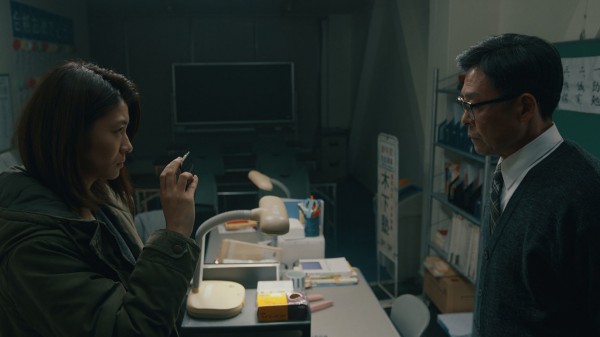
KUMI TAKUCHI, KEN MITSUISHI IN A BALANCE`
Last edited by Chris Knipp; 08-15-2021 at 01:06 AM.
-
SENSEI, WOULD YOU SIT BESIDE ME? 先生0、私の隣に座っていただけませんか?(Takahiro Horie 2021)
TAKAHIRO HORIE: SENSEI, WOULD YOU SIT BESIDE ME? 先生、私の隣に座っていただけませんか? (2021)
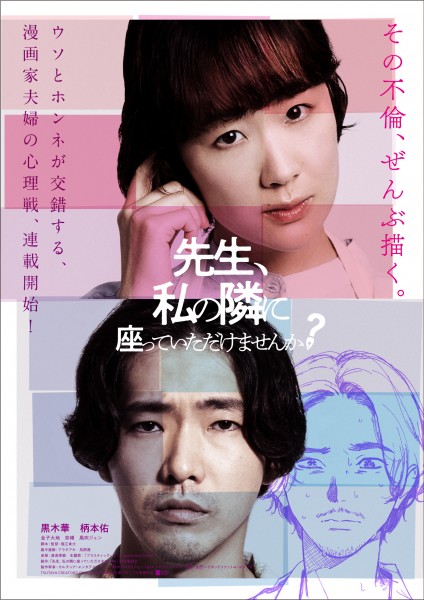
HARU KUROKI (TOP), TASUKU EMOTO (BOTTOM) IN SENSEI...
Living for manga
In his recent review of Sensei, Would You Sit Beside Me?, Reuben Baron reveals a much more detailed knowledge of Japanese manga than I have. This ins't difficult, since I know next to nothing. Mr. Baron may be right that speculations into the interface between the actual lives and the manga fantasies of real life "manga-kas," might be more interesting than the somewhat bland fantasy that unfolds in this new film. But if I may make bold to say so, he's a bit hard on this charming imagining of such an interface. The film is a bit long, a weakness of many of the NYFF Japanese crop this year. But it's quite engaging - and after the stern solemnity of Yujiro Harumoto's impressive A Balance, made a wonderful palate cleanser.
Toshio (Tasuku Emoto) and Sawako (Haru Kuroki) are what Baron cals a manga "power couple" whose creative and relationship difficulties overlap and combine to, at least, the eminent success of their careers. Toshio appears to be in a long period of creative dryness. Once a good while ago he as Sawako's teacher - hence the "sensei..." line, which has a playful double application. Now it appears they're been married five years, and Toshio has been having an affair with their editor, Chika (Nao Honda). One of the weaknesses of the film is we never see real signs of this affair or any chemistry between the actors playing Toshio and Chika. Rather like manga as seen depicted here, this film seems to be being made up in short spurts.
Emoto, who plays Toshio, is he best actor, with a range of gestures both comic and serious, which is a good thing because Toshio is the character whom we see the most and get the closest to. Toshio and Sawako go to the country to visit Sawako's mother (Jun Fubuki) - in her picture-perfect Japanese country house, whose ample summer coziness one relishes. Everything has a doll-like niftiness in this film, which is one of its charms: it's half-way a manga itself, and that's the point. In fact Haru Kuroki, who plays Sawako, has a doll-like sweetness that verges on the cloying. Not surprisingly, she turns out to have venom in her heart.
The trip to the country is meant to be distraction from the writer's block; Sawako too has it for the moment. She has finished a series, and can't think of a new one. The sojourn soon becomes a solution, after Sawako - somewhat oddly, at such a time and place - begins taking formal driving lessons. At first she reveals a phobia against driving, and can't seem to release the brake and step on the gas. But she perseveres, and soon starts spending all day away at the lessons, where Toshio must leave her and pick her up, and all evening drawing a new manga story. Toshio can't help sneaking peeks at each new sheaf of drawings, which Sawako conveniently leaves on a desk upstairs. Is Sawako making up what is happening, or is it really happening?
I have another question: does manga always consist of these saccharine, cutesy drawings of bland, spiky-haired youths? Does its content ever have any depth? I think the answer is yes, but that's not the kind of manga referenced here. Why is it, though, that the Japanese, who are so known for their historical epics like Kurosawa's Ran or films of sadness and profound redemption like his Ikiru, have such a love of cuteness and fey young men like Yuzuru Hanyu? (I admit I can never get enough of Yuzuru Hanu; but the manga drawings, ick.)
The fun of this film is the way once it gets going it runs back and forth between reality and the manga version, and the new sheaf of manga drawings Toshio peeks at turn into reenactments that may or may not be true. One really does get a sense of how some storytellers, old and new, may fray the line between their own lives and their creative mining of them. The depiction of this state of flux is enabled and made appealing by the gifted acting of Tasuku Emoto as Toshio. With limited material, he delivers a tragicomic range that is a real pleasure to watch.
Sensei, Would You Sit Beside Me? 先生、私の隣に座っていただけませんか?, 118 mins., premiered at the NY Asian Film Festival today, Aug. 15, 2021.
Last edited by Chris Knipp; 08-16-2021 at 09:50 AM.
-
ZOKKI (Takumi Saitoh, Naoto Takenaka, Takayuki Yamada 2020)
TAKUMI SAITOH, NAOTO TAKENAKA, TAKAYUKI YAMADA: ZOKKI (2020)

A manga tale collaboration
No, manga isn't all cute spiky-haired boys and girls like we see in Takahiro Horie's Sensei, Would You Sit Beside Me?, also in this year's NYAFF. This manga adaptation shows a far darker, gnarlier world with a whole panoply of people who aren't pretty like Horie's manga power couple..
Aki Kaurismäki comes to mind in this seamless anthology film blending two books by a celebrated manga artist in which humor teeters on the edge of drear. It is a comedy based on Hiroyuki Ohashi's manga Zokki A and Zokki B directed with different actors by three of Japan's leading actors and filmmakers. They blend together, but they don't. There are no clear-cut chapter divisions, and sometimes characters from one story briefly run into characters from another, all encountering each other in Ohashi's "obscure corner of the world" (an unbeautiful rural-urban part of Japan). But does it all blend together into some kind of unified whole? Not really. The project is the narrative equivalent of a surrealist "exquisite corpse," where artists connect their drawings to other artists' without seeing them. The title "Zokki" allegedly refers to the way paperbacks are bundled for sale in used bookshops. There you go.
And there is one young man - he looks too young to be working around porno - who repeatedly clocks in and out of a video rental shop, where there is a porn film featuring Mayumi Yusuda,,a star admiringly mentioned in segments, her tape first held by a nondescript guy who leaves home on his bike for points unknown in the film's first sustained scene. Later this gentleman is invited by an old fisherman to his shack, where he (the fisherman) gets a surprise birthday celebration. Later a friend of the fisherman turns up at the party hitherto unseen for some years, who has been in jail and can't go to his wife because they've had a fight. The fisherman begs the wandering cyclist, who's from the same town, to stop by some time and make peace with the ex-con's wife. Someone is moving the post-it notes to himself the video story boy is leaving overnight. Who is it?
These are the kinds of connections and threads the film works with. The most intense and memorable segment concerns two uniformed middle school boys. Makita, an ordinary, lonely boy and Ban, a tall, eccentric, shaven-headed, bespectacled one are the only friends each other has. As their friendship grows, Ban stops writing "I want to die" everywhere when that bent is replaced by an obsession with Makita's elder sister, whom he can never see because she doesn't exist; Makita has invented her to make himself more interesting to Ban. Makita uses a photo of Honda, a girl he was keen on in lower school as an object of worship for his crazy pal Ban. Later Ban seeks out the real Honda and asks her for a date. She rejects him but he is so persistent they eventually get married. Things go well he says, except she gets angry sometimes. The message of this seems to be that people who seem unbalanced when they are young may turn out to have normal lives.
Another sequence that gains some traction for a while focuses on a man and his little boy. The boy begs to be taken to an amusement park but his father refuses; he hasn't the money. Interchanges between father and son are vivid and amusing. The father instead takes his little boy on a jaunt where he breaks into his old school and steals a large punching bag from the boys locker room. The boy is well aware of the wrongness and danger of this exploit and is frightened, all the more so when his father temporarily runs off and the boy is approached by a mannequin that comes to life. Later the boy asks his father if she was a good or a bad spirit, and he says "That's a very good question." The story picks things up years later when the boy is grown up and the father, who still has the punching bag in his backyard, apologizes for his irresponsible parenting.
Makita, the nondescript schoolboy whose only friend is a deranged depressive; the numb, silent man who leaves home on a bike with nowhere to go; and the youthful drone working at the dreary job in the video store; even, though he has some flair, the irresponsible father, together build a sense that men are unimpressive and life contains little hope. This theme is alluded to also by a brief scene that opens the film between a girl and her aging grandfather, who declares that in life the happy moments are immediately followed by sad ones, and that the cycle grows closer and closer together with age so at last you cannot tell them apart.
This is a fascinating project, the three directors obviously have talent and the casting is excellent. The beauty is not in the generalizations but in the details. If it doesn't all hang together, perhaps that is the point. This would not be appealing to the more conventional moviegoer, of course. One wonders, if Hiroyuki Ohashi, the manga artist, had sset out to design his own film, from scratch, how he would have done it differently. Another filmmaker, also Scandinavian with whom this has much in common is Roy Andersson, of About Endlessness. But this doesn't reach for the sweet irony of Kaurismäki or the beauty and poetry of Andersson.
Zokki, 113 mins., premiered at Tokyo, also featured at Taipei (Golden Horse), both Nov. 2020; Shanghai Jun. 2021; screened for this review as shown on the internet as part of the NY Asian Film Festival Aug. 16, 2021.

THE VIDEO SHOP IN ZOKKI
Last edited by Chris Knipp; 08-16-2021 at 03:13 PM.
-
NINJA GIRLシュシュシュの娘(こ) (Yu Irie 2021)
YU IRIE: NINJA GIRL シュシュシュの娘 (2021)
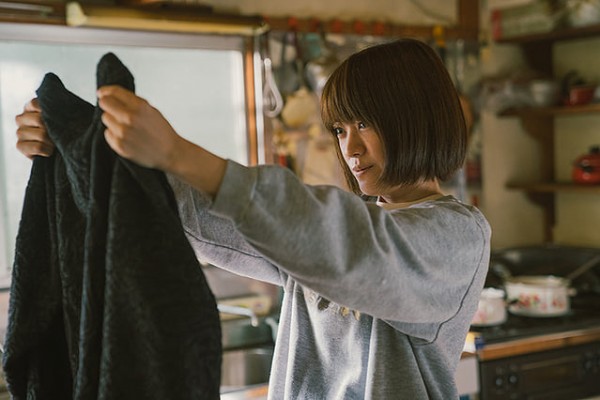
SAKI FUKUDA IN NINJA GIRL
Practical heroism
Revelations from Goro (Shôhei Uno), her crusading journalist grandfather (now bedridden), to shy 25-year-old Fukuya City Hall employee Miu Komaru (Saki Rukuda): fellow employee Koji Mano (Arata Iura), who has just jumped off the roof of city hall, did so because he had been forced to falsify documents to enable the Immigrant Elimination Ordinance to be rapidly passed. Goro, like Mano, passionately opposed this racist law, which if passed will legalize the expulsion of all immigrants from Fukuya City. So begins Ninja Girl.
Because the cinema industry of Japan was shut down in 2020 due to the devastation of the corona virus, Yu Irie chose to make an independent film dear to his own heart on a political subject to release in small local theaters. His unglamorous subjects are local government corruption and racism. Shot in composition-enhancing 1:33:1 aspect ratio, with delicate color, mixing handsome traditional interiors in wooded settings with bland office spaces and drab rural urban landscapes, this is a thoroughly oddball film, which cannot be taken seriously in every specific detail or its trajectory would be self-contradictory, making a crusader wind up looking more transgressive than the corrupt, bigoted local officials she opposes. The idea, I guess, is that contemporary Japanese should look to the honor and tradition of their ancestors and have the same courage they did in facing modern wrongs.
As the quiet bedroom discussion continues, their family has always had secrets, Goro murmurs. "We were a family of ninjas." The Karasumas (their family) were courtly dancers in the Muromachi era, Goro says, and then in the Edo period were spies for the shogunate. But since the Meiji era "our bloodline has faded." He was afraid it would die out when Miu's parents divorced, he says; that secrets would die with him. But now he wants to tell her. He has her take down some papers from the kitchen. "Don't open them!" he says of a package. "They're books I bought on Amazon." A touch of humor: but Goro gives Miu a serious ninja mission. She must now track down the video Mano secretly made of himself being coerced at city hall, so local government corruption in promoting the Immigrant Elimination Ordinance can be exposed. As Goro speaks now, his murmur begins to sound like the ritual chant of Noh drama.
Irie continues to build drama. Exaggeratedly meek at city hall, Miu will become bold when she dons the costume of a ninja. Going fabric shopping with her colorful lunch-mate Hitomi (Mayumi Kanetani), she buys a handsome roll of black cloth and at home sews up for herself a traditional masked ninja outfit, practices using a blow gun, which she used to play with as a teen, and goes hunting Mano's video against city hall enemies who are also tracking it, and confounds them. Getting the hang of the blow gun will take a while.
Another site she visits is a headquarters of opposition to the anti-immigrant ordinance, Takamine Scrap, the local place where many foreigners work, and Mano, an ally, was a frequent visitor. Mr. Takamine (Kirian Jou), however, sternly rebuffs Miu, associating her with city hall enemies. She comes back there and sees green-shirted vigilantes attack Takamine. Returning to their traditional Japanese house with its delicate wood and paper, Miu finds it has been attacked and defaced by the vigilantes, the data stolen, Goro terrorized.
The plot thickens. Miu is caught here and for the second time confronted by city hall officials, and now the mayor. She gets into personal trouble too. She has been wooed by Tsukasa, a local delivery person who keeps giving her rides, and finally bedded in his van at Sengen Shrine. Hitomi finds out about this and parts with Miu in great anger for this because she was "seeing" him.
Miu ramps up her ninja skills. The Ordinance gets passed. But jingoistic haters suffer a terrible toll in a climactic sequence that is a lot of fun - and not to be taken literally. One realizes that everything, Goro's hushed explanations to Miu from his bed, the ninja outfit, the Kafkaesque confrontations of Miu by city hall officials, as well as her final dramatic revenge, is all a little bit tongue in cheek and more than a little bit droll. The officials have been unpleasant buffoons, and watching their downfall is cathartic. When the final shots pull back to show the rural-urban landscape, we know we've penetrated just a little bit further into the wonderful complexity that is Japanese geography, history, and culture.
Ninja Girl シュシュシュの娘 ("Shu Shu Shu," the sound of a spinning ninja blade), 88 mins., debuted at Shibuya Euro Space Aug. 11, 2021; screened for this review as part of the Aug. 6-22, 2021 NY Asian Film Festival, shown for its international debut Aug. 15, 2021.
Last edited by Chris Knipp; 08-17-2021 at 09:16 AM.
-
UNDER THE OPEN SKY すばらしき世界 (Miwa Nishikawa 2020)
MIWA NISHIKAWA: UNDER THE OPEN SKY すばらしき世界 (2020)
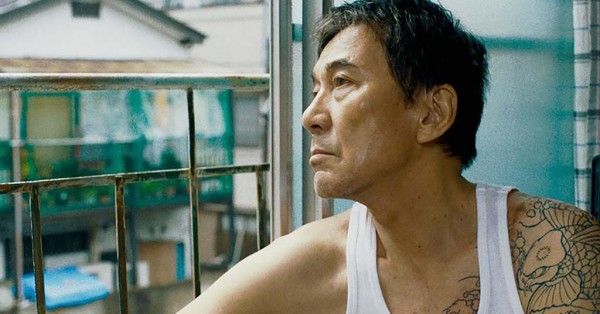
KOJI YAKUSHO IN UNDER AN OPEN SKY
Saga of an ex-con who tries to go straight
For her prisoner's tale director Miwa Nishikawa, a longtime associate of Hirakasu Koreeda, departed from her practice and adapted someone else's text, the 1993 Naoki-prizewinning novel Mibuncho (Identity Book) by Ryozo Saki. A formidable choice: the novelist's Vengeance Is Mine became Imamura's masterpiece. (Saki acknowledged the influence on his work of Truman Capote's "non-fiction novel" form, and this new movie teams with material.) Another valuable asset, by a good margin the most valuable, was the choice of the great Koji Yakusho to play the lead. The performance has won prizes and been called his career best. This film has much to teach us. But for all that, it seems somehow to lack a center and to be marred by excesses, too much detail, too little structure, moments of sentimentality, and a finale that gives way to melodrama. It's always a vivid, memorable film, one that takes us into a weary, suffering life as vividly as Bresson. But artistically it lacks finesse. That doesn't keep it, though, from being memorable.
What we learn are the specific details of something we already know: rehabilitation ain't easy, and assimilation is well-nigh impossible, especially in conformist, judgmental, legally rigorous Japan. The prisoner, Masao Mikami (Yakusho), has just served thirteen years for murder. He goose-steps and shouts out replies to officials obediently. He chooses to discard an expensive watch among his stored belongings that has gotten rusty. He mumbles "Screw you" and gets on the bus. He tells himself this time he will go straight.
As time goes on we learn that he was a driver for the yakuza (not strictly a member), that he was abandoned to an orphanage at age four by his geisha mother. His involvement in crime started early and he has spent 28 years in prison (nearly half his life). He also has a violent temper, and high blood pressure - a dangerous combination.
Once he's moved into a small flat, which he keeps very neat, Mikami tries to embark on a straight life. It doesn't work well. To renew his long-expired driver's license he must take lessons, and perhaps strangely, given his former job, he's terrible at driving. There are barriers at every step. The society does not want convicted felons. He has learned to be skillful at sewing leather in prison, but if that's where he learned it, a firm won't hire him. Identity Book, the name of Ryozo Saki's novel, refers to a peculiar Japanese institution, a collection of complete details about a prisoner that becomes available to people on the outside, which goes far toward making "a clean slate" impossible.
Mikami is surrounded by people he did not know who want to help him and several of whom become his friend. Souji (Isao Hashizune) is a lawyer who likes to help former prisoners, and he and his wife spend time with him early on. Tsunoda (Taiga Nakano) and his producer Yoshiawa (Misami Nagasawa), are TV people who film Mikami, thinking to make a show. They promise to help him find his mother, and this becomes a sustaining dream, a hope. A regular on the scene is the welfare officer Iguchi (Yukiya Kitamura), who is humbled by Mikami's rejection of handouts. Nearly as important as Tsunoda, who after being terrified by Mikami, begins to love him, is a local supermarket manager, Matsumoto (Seiji Rokkaku), who atones for wrongly accusing Mikami of shoplifting by giving him gifts and becoming a friend and advisor.
Mikami was in prison for killing a yakuza man who was menacing him and his wife with a sword. The film goes into too much detail about this, and introduces it in a gratuitous manner, even adding a courtroom scene; but what we learn is that it could have been considered justifiable homicide. Mikami is a man of violence and anger, and the many times he stabbed the assailant led to the murder charge and conviction. His violence is often in a good cause. Such is the case when he is with Tsunoda and his partner Yoshiawa and attacks two young punks bullying a helpless person. Tsunoda films this eagerly: a great scene for the series! But then Mikami becomes so violent it terrifies Tsunoda and he runs away. Yoshiawa chases and mocks him as a coward. She's finished with him, and apparently the filming for TV is over, and Tsunoda, estranged from Yoshiawa, begins following Mikami alone, without a camera, focusing on his original plan of writing a novel.
There is much more that will happen, including a vivid return to Mikami's hometown, Kyushu, to see his old yakuza buddy, Shimoinaba (Hakuryû), and his wife Masuko (Midoriko Kimura) and, on the way a very kind and lovely sex worker. As David Ehrlich says in his somewhat cruel IndieWire review, Koji Yakusho "knocks every scene" he's given to play in this film "out of the park," but one may indeed wonder if after a while "the movie around him" may begin "to feel like batting practice." (But see also Maggie Lee's extremely favorable Variety review, which also feels valid.)
As I watched Under the Open Sky (which fits the final shot of the film; but the Japanese title is the ironic one, "Wonderful World") in the back of my mind I compared it with 26-year-old Oudai Kojima's debut feature, Joint, another film in this year's NYAFF about an ex-con with yakuza connections finding his way on the outside. I was thinking not about Joint's conventional (but very contemporary) yakuza details, but about how the protagonist, a younger man, sets himself up after prison by working for two years far from Tokyo in construction and saving up enough money to set himself up in business. It's hard, and he only did two years in prison, but relatively, it goes so much easier - because he is not trying to go straight - quite. What emerges from Under the Open Sky - in fact it is repeated to us explicitly more than once (another weakness of the film that it spells everything out so much) - is that society pushes criminals to stay criminals, in Japan, anyway. Isn't that the life they have chosen?
Under the Open Sky すばらしき世界 (Subarashiki Sekai, "Wonderful World"), 126 mins., debuted at Toronto Sept. 10, 2020; it was also shown Oct. 23, 2020 at San Diego Asian Film Festival;at Chicago Oct. 2020 Koji Yakusho received the best actor award; Nov. 25, 2020 at Warsaw (Five Flavors); Dec. 5, Macao; Japan theatraical release Feb. 11, 2021; festivals in 2021 at Seattle, Jeonju, San Francisco, Barcelona, Tokyo IFF (internet), Frankfurt, Toronto Japanese Fest. (internet) Jun., Shanghai (Jun.), Pyeongchang (Jun.), Montreal (Fantasia, Aug.), and it was screened for this review as part of the 2021 NY Asian Film Festival (Aug. 6-22).
Last edited by Chris Knipp; 08-17-2021 at 11:28 PM.
-
HOLD ME BACK ( Akiko Ohku 2020)
AKIKO OHKU: HOLD ME BACK 私をくいとめて(2020)
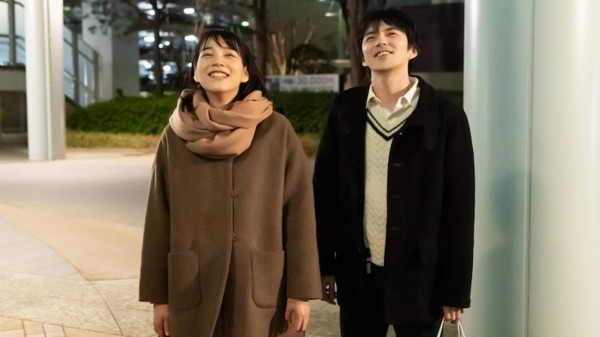
NON, KENTO HAYASHI IN HOLD ME BACK
TRAILER
Taking it slow
Adapted from the novel by Risa Wataya, this movie is about a young Tokyo woman on the far side of her twenties called Mitsuko (Nun) who has not been dating for a while. She talks to an imaginary man she calls A for "answer." Below her apartment lives someone who practices Khoomei, or Tuvan throat singing. She has a best friend at work, Nozomu San (Asami Usuda), and a childhood friend, Satsuki (Ai Hashimoto), who she goes to visit in Rome. And she has Tada (Kento Hayashi), a shy, lonely single of the opposite sex she knows from work. "Tada kun," as she addresses him, like a pal, starts to come over once a week, but only to collect a dinner she makes for him, without coming in, the only connection they have so far been able to arrange. One evening he finally comes in to consume the meal, only to leave immediately after doing so. (I was bothered by the fact that Hayashi is three years older than Nun and looks it, while Tada is supposed to be two years younger. Since they made an issue of it, it might have been better to find an actor who looked younger, not older, than Nun.)
The film is a quirky, sometimes fantastic, look at the phenomenon of singularity and loneliness among Japanese young people who may sometimes lack, or feel they lack, the wherewithal or even the courage to date, let alone to marry. Mark Shilling, of The Japan Times, compares the star, Nun (Rena Nounen), to Marilyn Monroe, because she seems to have a childlike, spontaneous femininity. For ten seconds I thought of Diane Keaton. Mitsuko doesn't have as many options. She plans spa visits and restaurant dinners to do on her own. And she goes to Rome to see that old friend, Satsuki, by herself: we see her through a somewhat troublous flight, with much turbulence and little sleep. It's really Rome, and Satsuki's Italian in-laws are there, all speaking Italian.
When Mitsuko and Satsuki have some quiet time together they share memories and nostalgia of younger days. Satsuki, who is pregnant, assures Mitsuko that despite her supposed bravery in marrying an Italian and moving to Rome, her world is even more confined than Mitsuko's. As Satsuki, Ai Hashimoto makes her appear an extraordinarily poised and beautiful woman, but she makes it clear that keeping it together is not that easy. In the trip to Rome one has the strongest sense of Mitsuko actually doing something, and this is the segment of the film that seems most real. However, it is an elaborate way of developing the usual rom-com "girlfriends" thread, taking the actual rom-com nowhere. Perhaps this explains why this film with so few characters and events runs to over two hours.
In the event, back in Tokyo Mitsuko texts her way to renewed contact with Tada, though whether he or "A" matters most to her remains somewhat uncertain. She is afraid of being abandoned by her imaginary friend, in case her boyfriend doesn't become that. But on a double date for a Valentine's Day climb of the Tokyo Tower with Nozomu San and her crush, the colorfully dressed Carter (Japanese-American actor Takuya Wakabayashi), who she's finally landed a date with, Tada proposes that he and Mitsuko officially date. Later they go to a hotel with a double bed but - spoiler alert - don't kiss, and don't undress: Tada wants to "take it slow."
They sure do. This reminded me of Emmanuel Moiret's 2007 Un baiser, si'l vous plaît? (R-V 2008), a French rom-com where a lot of discussion takes place about whether to kiss. This concern seemed amusingly old-fashioned. In Japan perhaps circumstances predetermine shyness to a greater extent.
Hold Me Back 私をくいとめて, 133 mins., debuted at Tokyo Nov. 5, 2020 (Audience Award); Japan theatrical release Dec. 18; Helsinki Apr. 2021, Taiwan theatrical release Apr. 2021; Toronto (Japanese Film Festival, internet), Jun. 2021; Shanghai, Udine, Jun.; Montreal (Fantasia) Aug. 5; screened for this review as part of NY Asian Film Festival (Aug. 6-22).
Last edited by Chris Knipp; 08-17-2021 at 11:38 PM.
-
A SONG FOR YOU 他与罗耶戴尔 (Dukar Tserang 2020)
DUKAR TSERANG; A SONG FOR YOU 他与罗耶戴尔(2020)
TRAILER
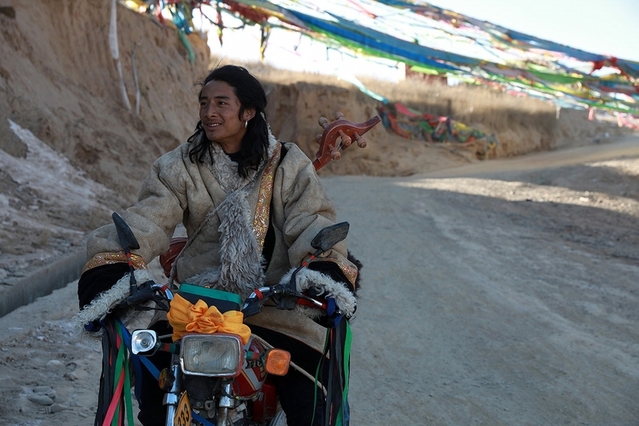
DAMTIN TSERANG IN A SONG FOR YOU
Rural Tibetan singer seeks pop marketability
A Song for You, Tibetan version, starts out with a swashbuckling swagger from its great-looking young protagonist Ngawang (Damtin Tserang) a nomad and shepherd-singer's son from the high Tibetan plateau part of southwestern China, riding in on a motorcycle with a black helmet, which he neglects to take off when he enters a room. Ngawang is going forth with his long-stringed mandolin and the intention of conquering the world. He wears his long sheepskin coat like a royal robe, his skin is olive and glows, his wide mouth has a sensuous twist, his almond eyes are soulful, and his hair is glossy and long. In his rural Tibetan way he's a readymade rock star. He will be tamed and commodified before the end, though we're spared the details, just shown the video disc album he gets made and some quick clips of him performing.
My hopes ran high when I saw that Jia Zhangke was a co-producer of this film, whose first-time director is known already as a sound and musical composition man. Marko Stojiljković of Asian Movie Pulse says he's "one of the most influential score composers and sound guys (handling everything, from design, via recording, to mixing) of the Tibetan cinema scene." So the tech side, both heard and shown, is authentic as can be. Music and sound design throughout by Dukar Tserang, of course. The drama side seems a little harder for him to keep going.
The thought that this rural Chinese setting might evoke the unpredictable complexity and cultural strangeness of Jia's early films was like a shot of adrenalin. But that doesn't happen. Tserang isn't as adventurous or gifted a director, the "star is born" theme is too hackneyed, and the milieu is mostly so rural (or invented and detached from the available reality) that its cultural content stays relatively thin.
Young Ngagwng doesn't conquer the world when he comes in from the bled, of course. He enters a little song contest and wins no prizes. It teaches him he's not the star he thinks he is and he learns he needs to get a record out before the public will pay attention to him. He meets a beautiful young woman singer who likes him, and they connect. Back home, he curses the big amulet he wears around his neck from his father, thinking it's lost its power. But the old picture inside it resembles the girl, and he starts to think she is the incarnation of what he calls Loyiter: Saraswati, the goddess of song and music. His father, to whom he is close and who encourages him, persuades him to keep the amulet. Good thing: it's an essential part of the "look."
Damtin Tserang never stops looking good, but he hasn't much to do in the rest of the film but be deflated and remain determined, and sometimes combative, whether against highway bandits or commercial studio nitwits, till finally he gets a studio gig and the poster and album out there. As a presence Tseramg can be a little zoned out-seeming, and the action doesn't necessarily pop when he's onscreen, nor the movie fully command its 93-minute run-time - short though, by the standards of this year's NYAFF roster, that may be. At one point the car Ngagwng is in out on the mountainous plain crashes and rolls down a hill; he soon recovers. The girl reappears; a pal (Pema Jyad) does too. His father he stays with by cell phone keeps supporting him - but he can never see him again.
When Ngawang gets to Xining to make his record, the big town of the Tibetan plateau (whose skyline we repeatedly gaze upon), he has raised money helped by friends. The traditional story line falters here: the album gets made; there are some hitches; so what? It's as if the first few sequences were as far as director Tserang had the filming planned, and inspiration faltered a bit. Lovely milieu and cast here, true details of the Tibetan music biz, but the structure gets in the way.
(Not sure where this narrative fits into the "free Tibet" story; but the protagonist sacrifices his native folk flavor to become a marketable, video-delivered pop singer, for sure.).
A Song for You 他与罗耶戴尔, 93 mins., debuted at Pingyao (the fest co-created by Jia Zhangke in 2017), Oct. 2020, also shown at Osaka Mar. 2021, at Rotterdam Jun. 2021 (internet). Shown Aug. 14, 2021 at the NY Asian Film Festival (Aug. 6-22), screened as part of that event for this review.
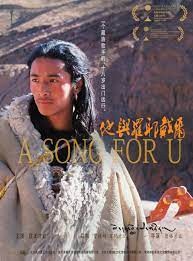
Last edited by Chris Knipp; 08-23-2021 at 05:22 PM.
 Posting Permissions
Posting Permissions
- You may not post new threads
- You may not post replies
- You may not post attachments
- You may not edit your posts
-
Forum Rules






 Reply With Quote
Reply With Quote








Bookmarks